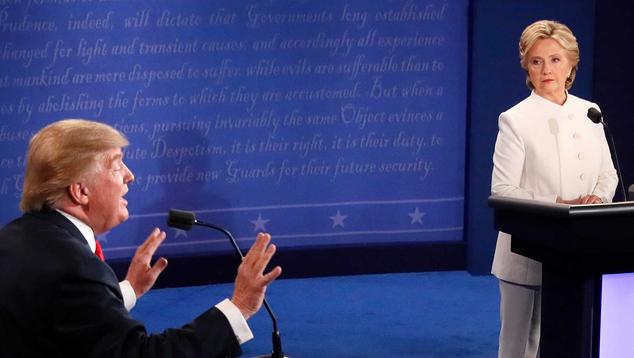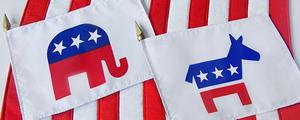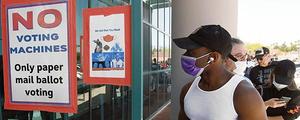In 2016, Gallup carried out a unique research project designed to monitor and measure the presidential election from the perspective of average Americans. Every day from July through Election Day, Gallup interviewers called random samples of Americans and asked what they had recently read, seen or heard about the two major-party candidates -- Hillary Clinton and Donald Trump. The results were recorded verbatim, and a team of Gallup, University of Michigan and Georgetown University researchers analyzed the responses, looking for common answers and frequently mentioned topics and events. This provided us with an excellent bottom-up view of the election as it was unfolding in the minds of the men and women who were its ultimate target, the voters, as opposed to the influentials, pundits, commentators and columnists who have the big megaphones.
Gallup published the results of this research periodically as it was conducted in 2016, and this year, the multiorganizational research team summarized the findings, along with analyses of the effect of social media during the campaign, in a new book, Words That Matter: How the News and Social Media Shaped the 2016 Presidential Campaign (Brookings Institution Press, 2020).
What did we learn that is applicable to both the processes and eventual outcome of the 2020 presidential campaign now underway?
One conclusion evident from the 2016 research: What is said and done in the campaign matters -- including in particular events and campaign occurrences. Many of the candidates' actions and major campaign events did percolate through to the consciousness of the public at large. This was particularly true for Trump. As the weeks went by in 2016, Americans fed back to us what they were reading, hearing and seeing about Trump's selection of Mike Pence as his vice presidential nominee, Trump's Republican convention speech, his criticisms of a Gold Star Muslim family that spoke during the Democratic convention, his comments about ISIS, his comments about immigration, his trip to Mexico, his comments about taxes, his debate performance and the release of the Access Hollywood tape. Americans also remembered having read, seen or heard Trump's critical comments about Clinton, including her health and -- as we shall see -- in particular about her emails.
Campaign events relating to Clinton filtered through to the public as well, including her choice of Tim Kaine as vice presidential nominee, her convention speech and her performance in the debates. Americans also recalled her near collapse from pneumonia at a public event on Sept. 11, Trump's branding of her as a liar, and allegations relating to the Clinton Foundation.
Most importantly, however, Americans' recall of what they had read, seen or heard about Clinton throughout the campaign was dominated by mentions of one word: emails. This focus on emails was by no means what the Clinton campaign wanted, and Clinton took efforts to minimize and dismiss discussions of emails as the campaign progressed. But to no avail. As we said in the book: "In 13 out of the 18 weeks covered in the project, emails were either the first- or second-most-frequently occurring substantive word in response to the question about what respondents had read, seen or heard about Clinton."
Clinton had been under the microscope regarding emails since 2015, when The New York Times broke the news story that she had used a private email account while secretary of state -- an account that included classified material. Clinton apologized, but traditional and social news media continued to focus on her email experience, fanned by conservative news sites, Republican politicians and the Trump campaign itself. FBI Director James Comey did his part to keep emails in the news with his controversial and periodic public references to federal investigation of Clinton's emails during the last four months of the 2016 campaign.
Americans were remembering emails when they thought of Clinton on a daily basis even though the Clinton campaign was engaging in as many actual campaign events as Trump. Clinton's campaign, like Trump's, was also consistently making policy proposals and addressing substantive issues. But clearly, many of these efforts by Clinton to get her message across with events, speeches, appearances and announcements didn't "take" -- in contrast to the consistent impact of emails in voters' minds.
As we wrote in the book: "Stories about email were not short-term events that just happened to occur during the campaign ... Their impact was most likely to keep an already highly salient issue in the public eye. The 2016 campaign may be an example of the significance of attitudes toward Clinton held by the mass public and journalists before the campaign. The strength of the email stories may have been due to their ability to sustain already existing concerns about Clinton, not produce new ones." Plus, the email controversy fit with Clinton's precampaign history of secrecy and involvement in legal controversies, as well as reinforcing the dominant critical positioning Trump was attempting to pin on her as the campaign progressed ("Crooked Hillary"). For Clinton, it was a perfect storm of a persistent theme that reinforced an existing narrative.
Many factors went into determining the results of the 2016 election. But Clinton herself acknowledges the impact of the email controversy in her post-election memoir (even including a copy of a word chart summarizing the Gallup research), saying that while she was subject to "a relentless barrage of political attacks and negative coverage," it was her job to "try to break through all that noise and convince the American people to vote for me. I wasn't able to do it."
By contrast, there was no single persistent negative theme that emerged when we asked people daily what they had read, seen or heard about Trump. This reflected his campaign's ability to define news coverage through attention-getting tactics that defied existing norms of political decorum, and the inability of the opposing campaign (Clinton's) to come up with a powerful negative narrative to use against him. Trump had a wide variety of characteristics, idiosyncrasies and historical behavioral patterns, which, in theory, could have filled the bill for such a negative branding. But what we learned from the people on a daily basis in 2016 showed that none stuck, at least not to the extent that the email positioning stuck to Clinton.
All campaigns work to create positive messaging about their candidates and to brand the opposing candidate with negative themes. Many of these don't stick. But the lesson of 2016 for this year's campaigns is that a candidate's branding or positioning can have real power and stickiness if it meets certain conditions: 1) it is based on actual occurrences in the real world; 2) it is persistently emphasized by the news media, social media and the rival campaign; and 3) it fits the precampaign history of the candidate's characteristics and behavioral patterns.
For 2020, a key question will involve the ability of the Trump and Biden campaigns to create or accelerate a dominating, negative theme that meets these criteria and comes to be widely associated with the other candidate. Both Biden and Trump have characteristics and flaws that could in theory be the basis for such branding, but nothing has surfaced so far in reference to either campaign that appears nearly as potent as the email theme attached to Clinton in 2016. Trump, for example, has consistently used the derogatory appellation "Sleepy Joe" to describe Biden, but it is not clear that this has been highly effective. On the positive side of the ledger, Biden's campaign website highlights the theme "Our best days still lie ahead," while Trump's website emphasizes "Keep America Great," a derivative of his 2016 theme, but it is unclear how powerful these themes will end up being.
Actual campaign events in 2020 will register with the people, as we saw in 2016, and Biden's vice presidential choice, the two conventions, the debates, and the inevitable (and unpredictable) occurrences and controversial statements uttered by the candidates will have their effect. But nothing will be potentially as effective or powerful as a single, resonating, candidate-characterizing narrative that lodges in voters' minds -- if either campaign is able to develop one for their candidate or against their opponent.




